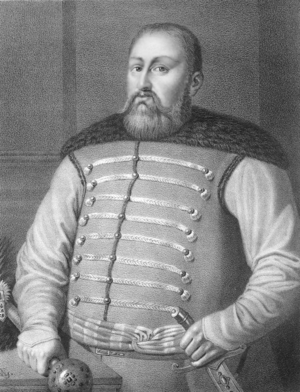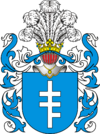Mikołaj Potocki facts for kids
Mikołaj "Bearpaw" Potocki (1595 – 20 November 1651) was an important Polish nobleman and military leader. He held powerful positions in the Polish–Lithuanian Commonwealth, like Field Crown Hetman and Grand Hetman of the Crown. A Hetman was a top military commander, like a general. He was also a governor (called a voivode) and a Castellan of Kraków, which was a high official role.
Quick facts for kids
Mikołaj Potocki
|
|
|---|---|

|
|
| Coat of arms | Clan Piława |
| Born | 1595 |
| Died | 20 November 1651 (aged 55–56) Chmielnik, Kingdom of Poland, Polish–Lithuanian Commonwealth |
| Noble family | Potocki |
| Consorts |
|
| Father | Jakub Potocki |
| Mother | Jadwiga Prusinowska |
Mikołaj Potocki was known for his military skills and his role in many important battles. He fought against different groups, including the Ottoman Empire and the Cossacks.
Contents
Early Military Career
Potocki gained early experience in battles. He was captured by the Ottoman Empire during the Battle of Cecora in 1620. This was a difficult time for him.
Later, in 1633, he helped defeat Ottoman forces at the Battle of Paniowce. He fought alongside other famous leaders like Prince Jeremi Wiśniowiecki and Stanisław Koniecpolski.
Fighting Cossack Uprisings
Mikołaj Potocki played a big part in stopping several Cossack rebellions. Cossacks were groups of people, often warriors, living in the borderlands of the Commonwealth.
The Pavlyuk Uprising
In 1637, Potocki defeated the Cossacks led by Pavlo Pavliuk at the battle of Kumejki. This was a significant victory for the Commonwealth.
The Ostryanyn Uprising
The next year, in 1638, he forced another Cossack leader, Dmytro Hunia, to surrender. After these victories, Potocki received large areas of land in Ukraine.
A historian and bishop named Szymon Okolski wrote detailed accounts of these Cossack rebellions. He was there and saw what happened, making his writings very valuable for understanding this period.
Later Conflicts and the Khmelnytsky Uprising
Potocki was known for being very strict with peasants and Cossacks. Some historians believe his actions were one of the reasons for the big Khmelnytsky Uprising that started in 1648.
Battle of Korsuń
In 1648, he attacked rebellious Cossacks in Ukraine, even though the king, Władysław IV Vasa, had told him not to. Potocki was defeated at the Battle of Korsuń and was captured by the Tatars, a nomadic group. He was held captive for a long time, but was released in April 1650.
Battle of Berestechko
After his release, Potocki continued to lead. In June 1651, he led his forces to a major victory over Tatar and Cossack armies at the Battle of Berestechko. This was one of the largest battles of the time.
Treaty of Bila Tserkva
Later that year, in September 1651, he negotiated a treaty with the Cossacks after the Battle of Bila Tserkva. This battle did not have a clear winner, so a peace agreement was made.
Family Life
Mikołaj Potocki was married twice. His first wife was Zofia Firlej, and they had six children together: Piotr, Stefan, Mikołaj, Marianna, Wiktoria, and Henryk. His second wife was Elżbieta Kazanowska, and they had three children: Jakub, Joanna, and Dominik Potocki.
 | Lonnie Johnson |
 | Granville Woods |
 | Lewis Howard Latimer |
 | James West |


